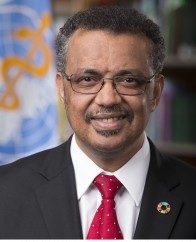
Commentary
 By Deepak Parvatiyar
By Deepak Parvatiyar
Having faced enough criticism from the Donald Trump administration in particular over his handling of the COVID-19 pandemic, with the USA accusing him of going soft on China to the extent of compromising public health, the World Health Organisation Director-General Dr. Tedros Adhanom Ghebreyesus chose the United Nations General Assembly platform to deftly attack his detractors, today.

“Many countries have succeeded in preventing or containing widespread transmission of COVID-19 with proven public health tools. This is not a fluke of geography or demography. These countries have proven that with science, solidarity and sacrifice, this virus can be tamed,” he told the special session of UNGA in response to the COVID‑19 pandemic, in his virtual address.
In the same breadth, without naming the USA, the worst affected nation with 1,37,59, 500 Covid-19 cases and 2,71, 233 deaths so far and still counting, he said: “But where science is drowned out by conspiracy theories; Where solidarity is undermined by division; Where sacrifice is substituted with self-interest; The virus thrives. The virus spreads.”
It may be mentioned that on July 7 this year, the US had notified the United Nations’ Secretary General, António Guterres, of its withdrawal from the World Health Organisation (WHO), with effect from July 6, 2021.
“In the past 75 years, the UN has had many successes, and many challenges. But none more than the COVID-19 pandemic, which has strained the very fabric of multilateralism,” Dr. Ghebreyesus told the UNGA. He continued in the same vein — ” The pandemic has shown what humanity is capable of at its best, and worst: Inspiring acts of compassion and self-sacrifice; breathtaking feats of science and innovation; and heart-warming demonstrations of solidarity; But also disturbing signs of self-interest, blame-shifting and division.”
Launching a scathing attack on the USA without naming it, he went on to say: “In 2015, the nations of the world adopted the Sustainable Development Goals, with their sweeping vision for people, planet, prosperity, peace and partnership. The same year, nations adopted the Paris Agreement and the Addis Ababa Action Agenda on finance for development, which I had the honour to chair. The world converged around a common vision for the future. But in the years since, we have witnessed a dangerous divergence. The Paris Agreement has been undermined; the commitments made in the Addis Ababa Action Agenda have gone largely unfulfilled; and although there has been progress toward the SDGs, too often our efforts have remained siloed and splintered.”
It may be mentioned that while the United States submitted formal notification of its withdrawal from the Paris Agreement to the United Nations on November 4, 2019, regarding the reaffirmation of the Addis Ababa Action Agenda, the US Mission to the United Nations had stated on November 21, 2019 that since “much of the trade-related language in the outcome document has been overtaken by events since July 2015; therefore, it is immaterial, and our reaffirmation of the outcome document has no standing for ongoing work and negotiations that involve trade”.
Dr. Ghebreyesus told the UNGA that the path ahead “remains treacherous”. He said while the International Health Regulations was a powerful legal tool, it was “clear that the IHR can only be successful if it’s based on mutual trust, mutual accountability, mutual transparency and robust political legitimacy”. He said he welcomed an initiative proposed by the President of the European Council, Charles Michel, for an international treaty to provide the political underpinning for strengthening the implementation of the International Health Regulations and global health security.
In Geneva, he told mediapersons during his press conference: “The pandemic still has a long a way to run and decisions made by leaders and citizens in the coming days will determine both the course of the virus in the short term and when this pandemic will ultimately end.”
At the UNGA, the WHO Director-General went on to say that although COVID-19 was a health crisis, “it has had implications for every area of the UN’s work”.
He sought to vindicate the WHO’s actions at the initial stages of the pandemic — US President Trump had publicly criticised WHO for mishandling the COVID-19 pandemic at its earliest stages.
Dr. Ghebreyesus explained: “In the earliest days of the pandemic, the (UN) Secretary-General and I agreed to trigger the UN Crisis Management Team, which has been led by WHO’s Head of Emergencies, Dr Mike Ryan; We’ve worked with colleagues across the UN family in multiple areas including supply chains, travel, communications, mass gatherings, the animal-human interface, joint work in countries and much more. For example, we worked closely with the World Food Programme, UNICEF and other partners to establish the UN Supply Chain Platform, delivering millions of tests and items of PPE to 179 countries and territories,” and again in a veiled attack on the USA and its Western allies, he retorted: “Although this is a global health crisis, it’s important to remember that not all countries have responded equally, and not all countries have been affected equally.”
Highlighting his own achievements, he said he had established a new Council on the Economics of Health for All, to examine and elucidate the links between health and inclusive, innovation-led economic growth. “The council will be chaired by the distinguished economist Professor Mariana Mazzucato, and Her Excellency Sanaa Marin, the Prime Minister of Finland, has generously agreed to be its patron,” he said.
He further highlighted that in April, with support from many partners, the WHO had established the Access to COVID-19 Tools Accelerator. “This is a completely unprecedented partnership with two aims: to develop vaccines, diagnostics and therapeutics fast; and allocate and deliver them fairly,” he said and claimed that already the ACT Accelerator had delivered “real” results — “We have reached agreement for the purchase of 120 million low-cost, rapid diagnostic tests for low- and middle-income countries. We have secured supplies of dexamethasone – the only medicine shown to reduce the risk of death from COVID-19 – for up to 4.5 million patients in lower-income countries. And as part of the ACT Accelerator, 189 countries and economies are participating in the COVAX facility.”
He reminded the UNGA that the ACT Accelerator faced an immediate funding gap of 4.3 billion US dollars to lay the groundwork for the mass procurement and delivery of vaccines, diagnostics and therapeutics. “A further 23.9 billion dollars will be needed next year,” he said and warned that unless the ACT Accelerator was fully funded, it was in danger of becoming “no more than a noble gesture”.
The Director-General outlined the following four key areas “in which we need the leadership of nations – as United Nations – to end the pandemic and build the post-pandemic world” :
- Invest in vaccines to end the pandemic – With positive results in recent weeks from vaccine trials, the light at the end of the tunnel is growing steadily brighter.
- Invest in preparedness to prevent the next pandemic
- Invest in health as the foundation of peace and prosperity – The world spends 7.5 trillion dollars on health every year which is almost 10% of global GDP. But most of this spending is in the richest countries, and is disproportionately directed to treating disease, rather than promoting and protecting health.
- Invest in multilateralism to safeguard our common future
In her address, UN Deputy Secretary-General Amina Mohammed said this special session came at a “critical moment”. She added: “If we make the right decisions now, we can meet humanitarian needs, reset development pathways, accelerate implementation of the Sustainable Development Goals and secure a life of dignity and opportunity for all, on a safe and healthy planet. That is the task ahead of us in 2021.”
Obviously, much more drama is to still unfold in this battle to control the WHO. How US President-elect Joe Biden deals with the tricky issue of WHO where China has become a key stakeholder, will be watched with interest the world over. Already Biden has picked up the cue, stating today that the US will not make the COVID-19 vaccines mandatory in his country. At the same time, he told a television channel that he was prepared to get inoculated publicly to instil confidence in his citizens about the vaccine. A survey by the Pew Research Center had revealed that only 60% of Americans were currently prepared to take a coronavirus vaccine.
As it is, Biden has a task in hand to undo the “wrongs” of his immediate predecessor. So it is safe to assume that China and WHO would now rank high in his agenda.






Good analysis
Very indepth analysis, forthright views good coverage.
Like to see more such articles
Thank you
As I site possessor I believe the content matter here is rattling fantastic , appreciate it for your efforts. You should keep it up forever! Best of luck.